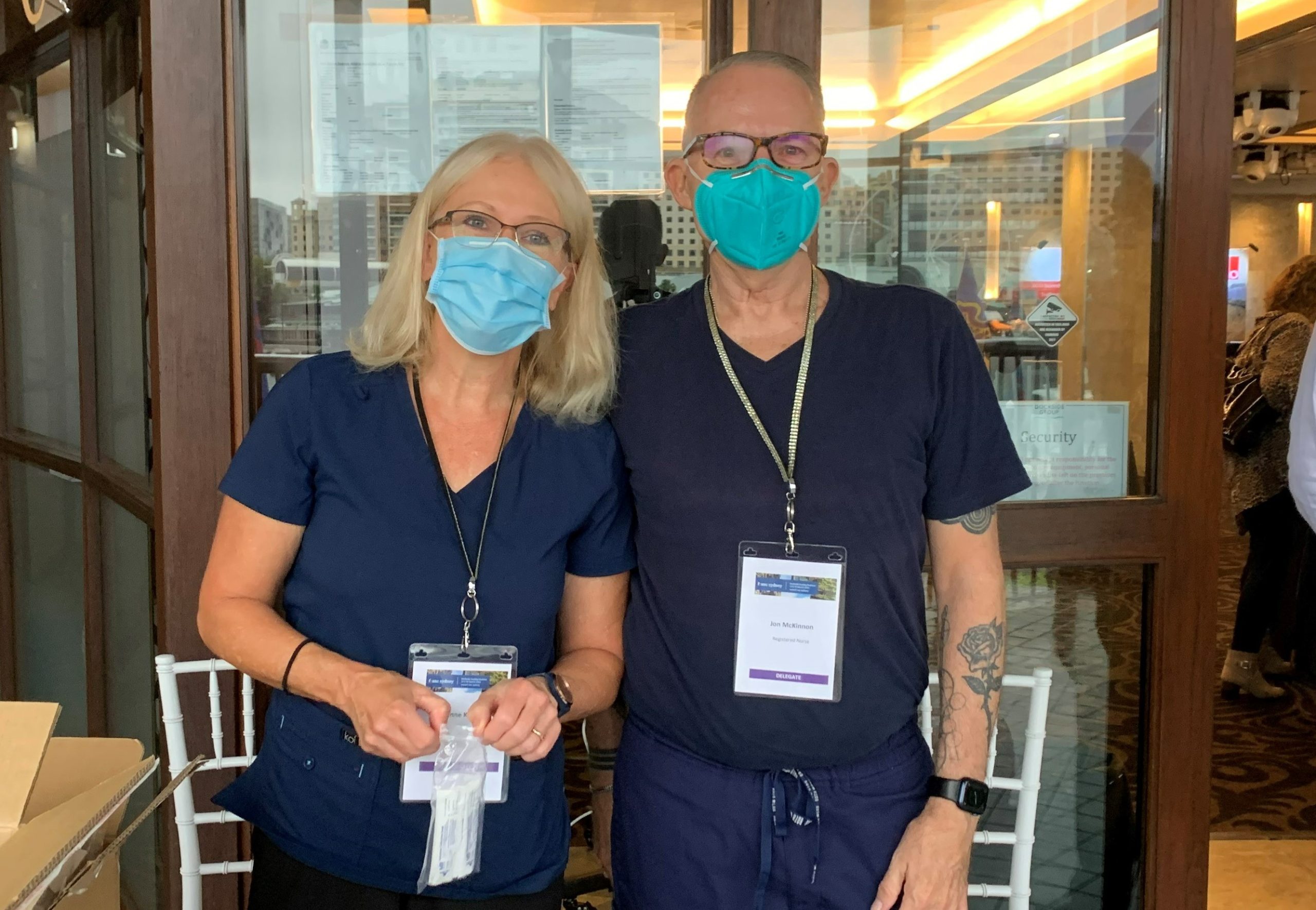GONE are the days of simple sponsorship when logos were traded for cash. With sponsors now acting more like event partners, meetings industry professionals are finding they have to change their approach.
“It’s a bit like marriage. Sort out how it’s really going to work before you say yes,” says Peter Jones of Melbourne-based Peter Jones Special Events.
And, like marriage, sponsorship is such an important commitment it has its advisers.
 ASAE: The Center for Association Leadership made event partnerships one of three major talking points at its Xperience Design Project (XDP) at the Gaylord National Resort and Convention Centre, near Washington DC, in April.
ASAE: The Center for Association Leadership made event partnerships one of three major talking points at its Xperience Design Project (XDP) at the Gaylord National Resort and Convention Centre, near Washington DC, in April.
The two-day project focused on “how to engage attendees through gamification, drive attendance at meetings, and create meaningful partnerships with industry suppliers”.
Indeed, ASAE listed no less than 28 strategic, corporate and event partners for XDP, with Amy Ledoux (right), the organisation’s senior vice president for meetings, expos and special events, explaining to MIX how important the support was to the event’s success.
“With the planning and executing of XDP, we carefully selected our partners based on the ability, expertise in the area in which we hired them, and areas that we felt we needed their expertise,” Ledoux says.
“The audiences that ASAE was attracting to the XDP event were ones that they currently work with and wanted to get additional exposure in front of by showcasing their capabilities with this new event.”
Ledoux cited 360 Live Media as an example of a sponsor that played a vital role. They helped ASAE take a different approach to its events. “It is never comfortable to make big changes with your event … even small changes,” she says.

“They helped us envision an event by talking to all the parties we identified as key audiences at our event, and they did a scan of what a successful event looked like to them. Then they helped us create the model for that event.”
Ledoux says there are key considerations to take into account when teaming up with a sponsor or partner:
• Ensure their ability to deliver on the event expectations – what experience they have with projects of the same scale and type.
• Understand whether they share the same vision as the event organiser or are able to expand and enhance your vision to make the event even better.
• Find out whether can they manage what has been designed in the “move in and out time” you have, and,
• Ask what relationships they can leverage to help deliver a flawless experience.
Ledoux sees modern sponsors as partners and says communication and mutual understanding are key to making a marriage of minds work.
 “In any partnership, make sure you outline what the opportunity is, what benefits the sponsor will get, make sure you deliver on those benefits, and if something changes, communicate that immediately. I think if you are a good communicator and understand your sponsors’ needs and expectations, you will avoid most pitfalls.”
“In any partnership, make sure you outline what the opportunity is, what benefits the sponsor will get, make sure you deliver on those benefits, and if something changes, communicate that immediately. I think if you are a good communicator and understand your sponsors’ needs and expectations, you will avoid most pitfalls.”
Communication, honesty and the ability to deliver on expectations are factors that meetings industry professionals agree are crucial to the success of any sponsorship or partnership deal.
Barry Neame (right), director of Consec – Conference and Event Management, says one of the most serious pitfalls of sponsorship is where events organisers make promises that they cannot deliver on – they should be transparent about what sponsors will receive for their investment.
“Sponsors will not be back and event organisers will get a bad reputation if they cannot deliver what the agreement has outlined,” he says, “Particularly in an industry sector where companies who are competitors will talk about their experience. It is best to under promise and over deliver.”
More: What works, what won’t – Peter Jones
Gary Bender (below), director and joint founder of Get Global, an industry exhibition focused exclusively on Australia’s outbound market, now in its second year, says sponsorship “is no longer about cash for logo placement, it is absolutely a partnership”.
“Our event is a platform for our sponsors to help solve their business issues,” he says. “The right event partners help us create a fully rounded and enriched programme. We work closely with our partners to ensure they fit with our event strategy, and we assist them to leverage their sponsorship and achieve their ROI.”
 Attention to detail and understanding are just as important as communication. “If you can demonstrate to a potential sponsor you have thought about their business and their challenges, and then how your event can directly assist them, you are more likely to get cut through,” he says.
Attention to detail and understanding are just as important as communication. “If you can demonstrate to a potential sponsor you have thought about their business and their challenges, and then how your event can directly assist them, you are more likely to get cut through,” he says.
Bender cites Get Global’s relationship with ICMI Speakers and Entertainers as an example of a win-win deal.
“We have been able to access globally renowned speakers and motivators to educate our attendees straight from the exhibition floor,” he says.
“We would not have been able to do this without the ICMI partnership. In return, we are helping them access hundreds of potential event organisers who will be inspired to look to ICMI to provide speakers for their international events.”
The relationship is much easier if there is already familiarity in an atmosphere of trust, but how can an organiser know whether a potential new sponsor or partner will be a good fit?
“Research, research, research,” is the answer given by Gene Capuano, vice president of convention and exhibition operations for Sands China. “You want to understand if the potential sponsor has donated in the past, to what types of events, and to what extent,” he says.
More from Gene Capuano here . . . Deals over coffee and Champagne
“Understanding the sponsor’s business is extremely important because you want to ensure that, not only do the products match, but the company’s values do as well.
“For example, if your event/company holding the event has a serious focus on sustainability and the environment, you want to make sure the sponsors you seek have the same values and can show you their company’s sustainable practices in their own business.”
 Capuano says it is important to formalise agreements when setting out the terms of engagement. “Many companies have strict compliance and legal terms when engaging a partner or sponsor,” he says. “These are of the utmost importance because it defines the integrity of the company. You want to ensure that you are compliant with any legal terms of a sponsorship.”
Capuano says it is important to formalise agreements when setting out the terms of engagement. “Many companies have strict compliance and legal terms when engaging a partner or sponsor,” he says. “These are of the utmost importance because it defines the integrity of the company. You want to ensure that you are compliant with any legal terms of a sponsorship.”
Although keeping costs as low as possible is an obvious major aim of sponsorship and partnership deals, they sometimes involve more than cash, facilities and products. Ideas and creativity are also potential gains.
“Often there are ideas we have for events that we can unlock when we find the right sponsor,” says Matt Pearce (above), CEO of Melbourne-based Talk 2 Media, and now also an AIME event director after taking over the show from Reed Travel Exhibitions this year. “If we are aligned we can bring new ideas to life, funded through the sponsor.”
Pearce cites Australia’s Talk 2-organised Good Food and Wine Show’s relationship with Citi as an example of sponsorship becoming a long-term partnership.
“We are now in to our sixth year, with Citi as our major partner of Good Food and Wine. Every year we set new goals and targets. We meet monthly, talk weekly, and all conversations are open and honest,” he says.
“The longevity of the arrangement talks to the success of this partnership. We don’t see it as a sponsorship as we work collectively.”
More: Three crucial issues – Roy Ying
TOP TIPS
Jeff Kear, co-founder and head of marketing and sales for the event management software company Planning Pod, has come up with a tips hit-list for working with sponsors.
1. Craft a unique selling proposition.
2. Build a professional brand image for your event.
3. Identify audiences and offerings that interest potential sponsors.
4. Reach out to your personal network first.
5. Build a list of targeted prospects that align with your USP.
6. Make first contact via email and social media.
7. Be personal and concise in your initial approach.
8. Pitch prospects information and data that hits their sweet spot.
9. Always, always follow up with prospects who didn’t respond.
10. Customise sponsorship packages based on each sponsor’s needs.
11. Deliver and over-deliver.
12. Keep sponsors involved and informed throughout the process.
13. Share hard ROI data after the event.
14. Continue the sponsorship after the event is over.
Full advice at planningpod.com



